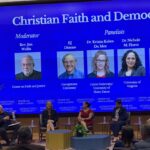Archbishop Joseph Kurtz of Louisville, Kentucky and Chairman of the United States Conference of Catholic Bishops Committee for Religious Liberty discussed the current state of religious liberty in America at the Catholic Information Center on September 12. Of immediate interest was the impact of the current controversy over clerical and episcopal wrongdoing. Kurtz acknowledged that the failure of clergy and bishops to rectify a problem known for many years has made advocacy of religious liberty difficult. Nevertheless, the church continues to be a firm advocate of religious liberty as part of its mission in the world. Kurtz said that “we are called by Jesus Christ to inspire the culture.” The case for religious liberty at the present time should focus on three points:
1) “Rightly ordered politics needs to be undergirded not by raw power, that imposes, but rather by the process of seeking the truth together.”
2) “We are called by Jesus Christ to inspire a culture;” faith “is personal, but also public.”
3) Society should “create space so that people can serve with integrity of faith.”
Kurtz said that there are many threats to religious liberty in the world at large that Americans do not commonly think about or are even aware of, and intense persecution of the kind that does not occur in America. Christianity may be “wiped out” in its much of its birthplace, the Middle East, for instance. In Nigeria, over 200 churches have been destroyed, and over 20,000 people have been killed.
In America, religious believers do not face the same violent persecution, but they do face grave legal attacks on their overriding duty to obey God, as they understand his commands to be in terms of their faith. Kurtz referred to the HHS mandate, which required religious organizations to facilitate contraception and abortion inducing drugs in medical plans for their employees regardless of their religious commitments. Such a requirement makes genuine Christian service an impossibility, since one must disobey God in the course of service. It might be added that for Catholics, works of charity are integral to the faith, and thus free exercise of religion is being denied. This conflict is now “less intense” (with the change of government), although the arrival of same-sex marriage continues to create conflict. Kurtz believes (this writer would say optimistically) that the Masterpiece Cakeshop case “gave some direction for the ability to carve out in our society the ability to serve others and serve with integrity of faith.” Foster care and adoption agencies are one area of intense conflict, with various jurisdictions having prohibited this service on religious principles, which require to service only to couples “with a married mother and father.”
But a “deeper” threat to the ability to live life in accordance with God’s commands than the above legal threats, Kurtz maintained, “is the steady move in our culture away from religious institutions.” This results in many people, including believers, seeing religious commitment as entirely a private matter, with any public consequence of that commitment a violation of other persons. Thus religious freedom is no longer seen, as it traditionally has been in America, as a good in itself. This writer would add, however, that even if faith and liberty are seen in entirely individualistic terms, it is an obvious violation of religious liberty if people are required to take action against religious precepts, which is the crux of the current religious liberty controversy in America.
Kurtz said that “a rightly ordered polity” cannot be one in which all values are treated as equal, and thus in which politics is a mere struggle for “raw power,” but one which assumes the dignity of the human person, so strongly asserted by the Second Vatican Council, and which is rooted in the Biblical doctrine of man created in the image of God. An individual’s apprehension of ultimate reality and commitments, what Christians would call his or her duty to God, should serve as the basis of life, to be respected by the state and the wider society. He believes that the substantial majority of Americans continue to believe in this vision. But there is an erosion of this vision, as people increasingly see ultimate personal commitments not as a search for truth outside ourselves, but simply what is deeply, personally important to the individual. This does result in politics being a mere power struggle. But politics should be a matter of seeking truth, Kurtz said.
The Christian vision of reality, Kurtz said, is not just personal encounter, but an effort to provide inspiration for “an entire culture.” For Christians, providing this vision is “a civic duty.” He quoted Pope Francis in his 2015 visit to America as saying that “one of America’s most precious possessions is religious freedom.” The Pope urged Christians “to be vigilant precisely as good citizens to preserve and defend that freedom from everything that would threaten or compromise it.” The Pope pointedly visited the Little Sisters of the Poor, at a time in which they were struggling against the HHS mandate to serve according to their consciences.
Archbishop Kurtz said that “at the heart” of Catholic social service is a vision of the “dignity of the human person … from conception to natural death,” and of the family as the “building block of a healthy society,” a vision which is commended to all people. This leads naturally to the need for the “freedom to serve others” in terms of that vision. Those engaged in religiously inspired social service “need space to serve others with integrity.” He said that this is well illustrated by the plight of the Little Sisters, who were given “an impossible choice” in which they either had to cease their service or give up the mission of serving God in accordance to his commands. Foster care was again mentioned as an area of intense concern, because there is an acute need for service, with “over 100,000 children” who need to be accommodated (with increasing numbers due to the opioid crisis). But religious social service, historically an important and excellent part of the answer to the problem, can only provide this service consistent with its faith. Essentially providers are being eliminated so that people who disagree with religious commitments will not be offended.
Regarding partnership between the religious charities and the government, Kurtz pointed to Pope Benedict XVI’s encyclical Caritas Est (2005), in which cooperation between the church and state is held as proper, while yet maintaining freedom from coercion and the distinct roles of church and state.
Kurtz said that we should be “grateful to live in a nation that seeks the truth rather than imposes the truth.” In response to a question, he said that countries in which there is religious repression “tend to be the areas where civilization is not flourishing.” In response to another, he said that in the face of continuing threats to religious liberty, believers should cultivate the “four C’s” of “courage, compassion, civility, and calm,” with courage identified as the most in need of cultivation. In the area of courage, what is in particular needed is the ability to articulate religious liberty in an actively hostile or suspicious culture. Those who are simply trying to win, which is true of opponents who believe that disagreement is only about power, will simply “shout down” religious liberty advocates.
A questioner asked how Christians should respond if the state becomes increasingly hostile. Should Catholic social services be closed if they cannot function in integrity? Kurtz responded that the church has functioned in many different environments over the centuries. If social service cannot be given in a way consistent with Catholic faith, “it is better not to put the name Catholic” on such agencies, but the church must find a “new way to go forward” and practice charity toward neighbors. Not receiving government grants may be one way in some circumstances to maintain religious services, but Christians “should not be shy” in engaging government and politics to protect religious practice outside of church walls.
Questions turned back to the clerical crisis, with Kurtz responding that among other things, the crisis has highlighted the deep effect that sexual abuse has on its victims, and should point the church and Catholics toward a renewed emphasis on chastity, which has been too often ignored in the contemporary church.
The duty to be obedient to God’s commands, brought out in Kurtz’ response to the last two questions concerning the need for religious social service to be genuinely religious, and the duty of individual holiness, is really the reason Christians pursue religious liberty. This pursuit is not done to live the life we might prefer, not a claim to self expression, but in the interest of obeying God. Without obedience to God’s commands, there is no Christian life, and without Christian life, there is no point to religious liberty. There must be more to our lives than the requirements of this world.
No comments yet





Leave a Reply